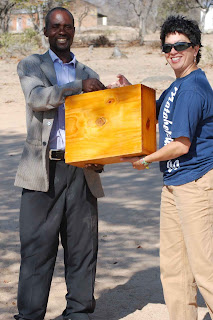 |
| Coordinator with Q |
AFCA provides these kits to the communities with refills for the first year of a program. As families earn money from the sales of milk, manure and veggies from gardens, the community must cover the costs for the refilling of kits after the first year.
Just last week, we had 15 goats get sick with pneumonia. As families noticed that their goats were not doing well, they ran to tell the para-vet, who checked them out. Soon, medicine was dispensed to the owners of the goats and in no time, the animals were receiving antibiotics and now, they are doing well. I was happy to be here to witness how the community worked together to put to use the available medicines and how quickly they were in touch with Q to keep him informed of the going ons and how they cared for their animals. Every one of the families has told me how well they have been trained and how nice it is to be able to care for their animals as they are able to.
July 26, 2012 - Bulawayo, Zimbabwe
 |
| Juju going to school - in uniform |
July 27, 2012 - Ntepe, Zimbabwe
Q and I hit the road again, this time heading south, towards South Africa. We are going to the first area where AFCA/ZOE distributed goats. It is time to visit the families with a spot check. They don't expect us, so we feel we'll get a good read at how things are going.
It is a gorgeous day, with blue skies that make me want to reach out to see if it is real. While needed, rain is not even a possibility today and the day feels perfect. We arrive at the coordinator's house and Q hands me the truck keys, as four of us won't fit in the cab. He and a beneficiary sit in the back while the coordinator and I sit in the cab, with him giving me directions and me driving over bumps, rocks, bits of wood, holes, and sand. We arrive at the first house and meet with a grandma who just this morning lost her daughter and was put in charge of her grandson.
This boy and his mother had received goats three years ago because she was very ill and we needed to help the boy become able to care for himself at her demise. He is still young and grandma will take care of him now. Their goats have gone from 3 pregnant ones to 23!!! Their flock is amazing and they are all healthy goats. Since three years have passed, it is time to redistribute and to bless another orphan family with three goats. The redistribution celebration will happen in November and I couldn't be happier. There will be 15 goats redistributed in total this year! Seems like a small number, but this is a sure sign that what we've begun here is working.
Since there has been a death in the community, most of the families are making their way to the church and we aren't able to meet too many families. We met with one woman who has raised 3 children and has one more at home. They've had goats for two years and their flock now totals 8, due to the death of two kids (drought). Another family lost two goats to cobra snake bites. One other family, represented by a 13 year old boy, has 9 goats, with another kid ready to be born any day now. This boy was so sweet and made my day by smiling as he talked to us. It is so hopeful to see these families and to have them tell us about the program and how they attend trainings and to hear how the flocks are growing. To everyone who has donated towards this work - well done and thank you!




















